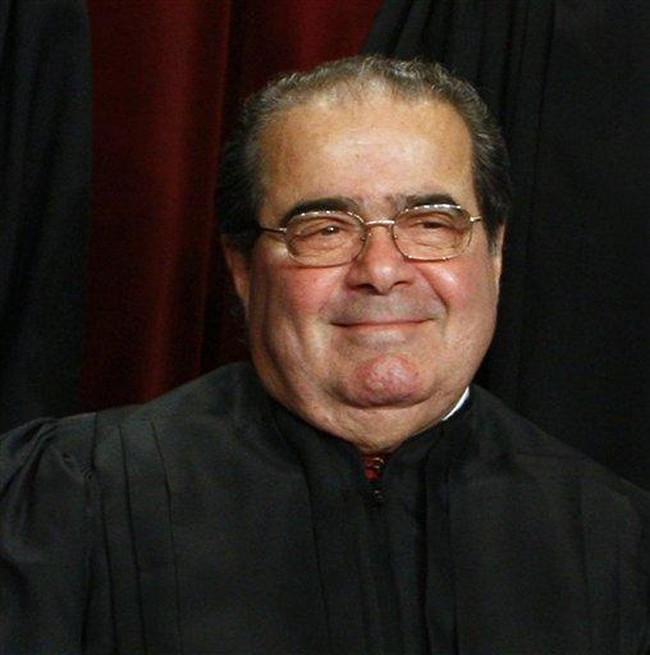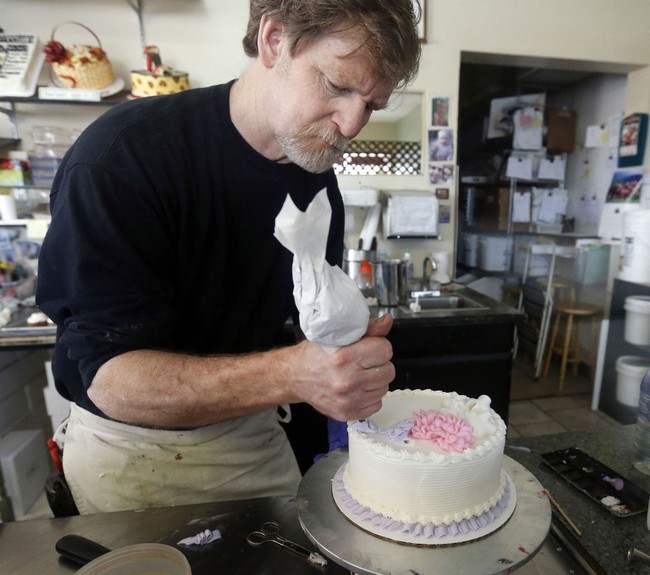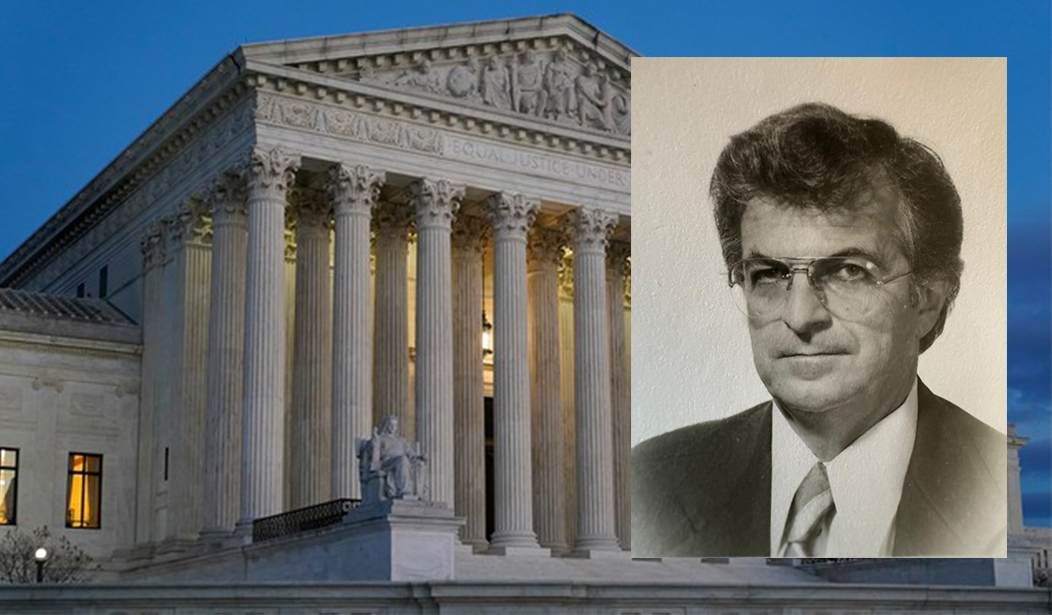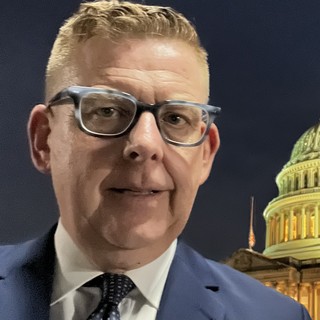Texas Republican Sen. Ted Cruz joined the chorus of conservative legal giants praising civil rights attorney Chester J. Darling, who won the landmark 1995 Hurley v. Irish-American Gay, Lesbian, and Bisexual Group of Boston Supreme Court decision, a decision which has become the cornerstone First Amendment ruling defending Americans for government-coerced speech, passed away Nov. 16, nearly two weeks after he celebrated his 94th birthday.
“Chester Darling’s contributions to the defense of religious liberty and free speech cannot be overstated," said Cruz to RedState, who as Texas' solicitor general argued nine times in front of the Supreme Court.
"His successful arguments before the Supreme Court in the landmark Hurley case proved foundational to recent arguments cementing our religious freedoms," he said.
"The country owes him a debt of gratitude, and my prayers are with his son Brian and the rest of his family at this time," the former law clerk for Chief Justice William Rehnquist said. Brian Darling served for many years as a Senate staffer and senior fellow at the Heritage Foundation focused on supporting Senate conservatives.
“Chester Darling was a brilliant attorney whose impact on the First Amendment can’t be quantified,” Mike Davis, the founder and president of the Article III Project, told RedState.
“Darling set a powerful precedent in support of free speech by securing a unanimous 9-0 decision in the landmark Hurley Supreme Court case that rippled through subsequent First Amendment cases,” said the former chief counsel for nominations to Senate Judiciary Chairman Chuck Grassley (R.-Iowa). “This ruling laid the groundwork for legal principles used in cases such as the Masterpiece Cakeshop decision.”
Davis said Darling’s legacy would endure.
“Chester Darling's unwavering commitment to defending free speech and expression left a permanent mark on our understanding of the First Amendment,” he said. “His contributions reflect a dedication to the principles that safeguard our democracy.”
Darling, who joined the Massachusetts Bar in 1970 after graduating from the New England School of Law, was a personal injury and family law attorney with a streak for seeking justice against long odds.
One example was a French-Canadian Catholic nun who reached out to Darling after her order evicted her from her convent because she could no longer work. Convinced the sister was in the right, he hired a scholar to translate the sister's contract with her order from medieval French.
As Darling suspected, the contract promised that the order would take care of the sister for the rest of her life.
Armed with the translated contract, Darling's next move was bold and straightforward. He hired a high-profile socialist lawyer in Rome, who served the pope in person.
Soon afterward, a law firm representing the Catholic Church reached out to Darling, and the sister was taken care of—presumably for the rest of her life.
Darling’s legacy as a First Amendment champion was made when he represented John “Wacko” Hurley, the leader of an organization of Catholic war veterans, the South Boston Allied War Veterans Council.
When a group of veterans advocating for non-mainstream lifestyles asked to march in the annual South Boston St. Patrick’s Day Parade, organized by the council, members of the council voted to exclude the gay veterans.
Even though politically he had always been an old-line liberal, Darling took the case.
When Hurley died in 2015, the lawyer told The Boston Herald: “He was a client for 22 years and he was a good man. He had nothing to say in a negative way of anyone else. He just wanted his old-fashioned parade. That’s all.”
Days before the 1994 parade, the Massachusetts Superior Court ruled that the council had no right to exclude the gay marchers, so the parade was canceled for the first time since it was started in 1947.
As Boston Mayor Thomas Menino scrambled unsuccessfully to find a last-minute sponsor for the parade, Darling vowed to take the case to the Supreme Court—and he tapped his own savings to make it happen.
In the April 25, 1995, oral arguments, Darling was subjected to tough questions, especially from Justice Ruth Bader Ginsburg.
“That's the essence of your argument? It's your parade to make it do whatever you wanted to do?” Ginsburg asked.
Darling did not have a moment of hesitation despite being on his profession's most important stage.
“That’s correct. Justice Ginsburg,” he said.
“My clients define the scope and content of the parade. They vote to include or exclude people and groups with messages that they approve of in their parade that are consistent with the overall theme, the celebration of the patron saint of the Archdiocese of Boston, St. Patrick,” he said.
In one exchange, Justice Antonin Scalia reminded Darling that in his brief, he had argued that even if the organizers of a parade had no message at all, they still had the right to exclude participants bringing their own message.
"I would think you still have an argument that even if it is neutral in its custom and in its format, you have the right to say that it cannot be used for some other person's message," Scalia said.

Darling accepted the assist and replied by reframing back to the question of government coercion: “The fact is that any group of people or any individual cannot be compelled to speak in behalf of the state or be the courier for the state's message.”
Boston attorney and author Harvey Silvergate told RedState he knew Darling at the time he was fighting the Hurley case.
“When he decided to bring his lawsuit on behalf of the South Boston Allied War Veterans Council, he consulted me because I was, even back then, an expert on the First Amendment – both its speech and its religion clauses,” he said.
“Aside from litigating such cases, I was at the time a member of the board of directors of the Massachusetts chapter of the American Civil Liberties Union back in the day when it was a true civil liberties rather than a “progressive” organization,” he said.
“Chester consulted me all the way up to the Supreme Court where, I told Chester, we were almost certain to win because the case was so clear,” said the co-author of the 2020 book “The Conviction Machine.”
Silvergate said despite Darling winning such a significant victory in the Supreme Court, he was not appreciated by his peers back home.
“I believe that the Boston legal community under-rated Chester because he was openly patriotic as well as deeply religious – two qualities that at that point in Boston’s history were starting to be cast into disrepute,” he said.
“It marked the beginning of Boston as a ‘progressive’ rather than a ‘liberal’ city,” he said.
George Braun, who was part of the winning legal team for the Supreme Court's 2005 Granholm v. Heald decision, told RedState it was interesting to him that Darling won such a significant case that protected conservative interests, but he was himself a liberal attorney.
"It was back in a time when the ACLU, the Democratic Party and the left in general believed that The Bill of Rights protected all of us and that the First Amendment was first for a reason," he said.
Braun, who was a staffer for Justice Sandra Day O'Connor, said it did not surprise him that Ginsburg voted with Darling, even after seeming to give him a hard time in oral arguments.
"Justice O'Connor told me that for the justices, the oral arguments were not about stumping the attorneys. Instead, the justices use the attorneys like pawns," he said.
"They are pawns because the justices use their questions to find out where the other justices are at with the case, and let the others know where they are at," he said.
In the three decades since Justice David Souter issued his June 19, 1995, opinion on behalf of the high court's unanimous 9-0 majority, the Hurley decision has been cited in hundreds of cases.
Although no Supreme Court is legally bound by decisions by prior courts, in the tradition of the common law, the Supreme Court has a heavy bias to build upon previous rulings, which gives American constitutional jurisprudence its continuity. When decisions are overturned, it is a significant event, and part of the court's calculation considers how the previous justices voted.
As it goes, a 5-4 decision is more vulnerable than a 6-3 or a 7-2 majority. In the case of Hurley, a 9-0 decision written by a revered justice such as Souter, it is virtually unassailable.
Hurley was part of the critical precedence in the high court’s 2018 Masterpiece Cakeshop v. Colorado Civil Rights Commission ruling, where the court ruled that the baker could not be forced to create a bespoke wedding cake for a same-sex couple.
More recently, Hurley was again cited in the 303 Creative vs. Elenis case, where the high court ruled that a web designer could not be forced to create a website for a same-sex couple’s wedding.
Darling partnered with Alliance Defending Freedom
Kristen Waggoner, the CEO, president and general counsel of Alliance Defending Freedom, was the winning attorney in both the Masterpiece Cakeshop and 303 Creative cases, and she told RedState that Darling's work was critical to defending Americans' freedom to express themselves as they wish.
“We mourn the passing of a heroic champion for freedom of speech, Chester Darling,” she said.
“His courage and tenacity won an important victory at the U.S. Supreme Court in Hurley protecting all Americans’ freedom to decline to express ideas they do not believe,” she said.

“Hurley set forth bedrock free speech principles that have protected millions of Americans regardless of their viewpoint, and it was recently reaffirmed by the Supreme Court in 303 Creative,” she said. “ADF was honored to work with Chester on his important Supreme Court win in Hurley.”
Jordan Lorence, ADF’s senior counsel and director of strategic engagement, told RedState that ADF’s founder Alan Sears backed Hurley’s Supreme Court appeal after he had read in the newspaper that four justices had agreed to hear the case, an action called certiorari.
“ADF learned about his case after the Supreme Court granted cert, by me reading a newspaper article about the cert grant – remember, the internet was not widely in use in January 1995,” he said.
“Alan Sears then directed us to offer him help, which Chester accepted,” he said. “ADF had only opened its doors 12 months earlier.”
Lorence said it was easy to be discouraged, but Darling's determination made the case a winner.
“Chester lost his case at each step of the way through the Massachusetts state court system, including a disdainful loss at the Massachusetts Supreme Judicial Court,” he said.
“Chester felt so strongly about the correctness of his First Amendment theory that this was unconstitutional compelled speech,” he said. “He paid for the appeal to the Supreme Court by using money from his retirement accounts to pay for the printing costs and other expenses to submit his cert petition to the Supreme Court.”
ADF also helped prepare Darling for his day in court, he said.
“ADF contributed money for his time and expenses, like printing costs for the merits briefs, etc. ADF gave him advice on the content of his merit’s briefs,” he said. “ADF also set up a moot court for him, which I think was the only moot court he did for the oral arguments.”
The Supreme Court’s session runs from the first Monday in October until the end of June. It is the custom of the high court to hold its most controversial or anticipated cases until the end of the session.
Lorence said he remembered his own role in supporting Darling, including checking to see if the decision had dropped.
“Back in that day, when cell phones and the internet were not yet widespread things, I personally served Chester by going to the Supreme Court every day when it handed down decisions in June 1995,” he said. “So, I could immediately know how the Court ruled and then could communicate it to him.”
It was a different time, and news traveled on copper phone lines.
“Each day after the Supreme Court finished announcing the opinions for that day, I would run across the street to the Hart Senate office building, which had pay phones, and would call Chester to tell him whether the Court had issued a ruling in his case or not,” he said.
“I had the joy of calling him the day he won to tell him that the Supreme Court had ruled unanimously in his favor and had reversed all of the negative lower court decisions against the veterans group,” Lorence said.
“His tenacity and dedication to free speech principles won the day,” he said. “We all are much better off because Chester won this case against government coercion.”
John Eastman: I relied on Darling’s Hurley work in my first SCOTUS case
Attorney John Eastman, a senior fellow at The Claremont Institute and the founding director of the institute’s Center for Constitutional Jurisprudence, told RedState he is an admirer of Darling's contributions to the defense of the First Amendment.
“I was not fortunate enough to have ever met Chester Darling in person, but I was certainly aware of his work, particularly his successful representation of the South Boston Allied War Veterans Council before the Supreme Court,” Eastman said.
“Mr. Darling’s victory in that case reaffirmed the importance of the First Amendment’s Freedom of Speech and Freedom of Association in the face of what was then just beginning to be a challenge to those core constitutional rights by those who held different views on controversial social issues,” he said.
Eastman said he relied on Darling’s Hurley work in his first case before the high court.
“The victory he achieved served as the foundation of the first Supreme Court case in which I was involved just a few years later, Boy Scouts of America v. Dale,” he said.
“His life’s work helped us all to remember that the First Amendment is most important when it protects speech that those in power do not like, and that message is becoming increasingly important in this modern era of ‘woke’ America,” he said.
In his retirement, Darling retreated to the comfort of his Andover, Massachusetts, home and his family, spoiling his grandchildren, coaching his children, and enjoying the companionship of his devoted wife Daphne.
When he was called to his reward, he was surrounded by his family, who are his true legacy.














Join the conversation as a VIP Member